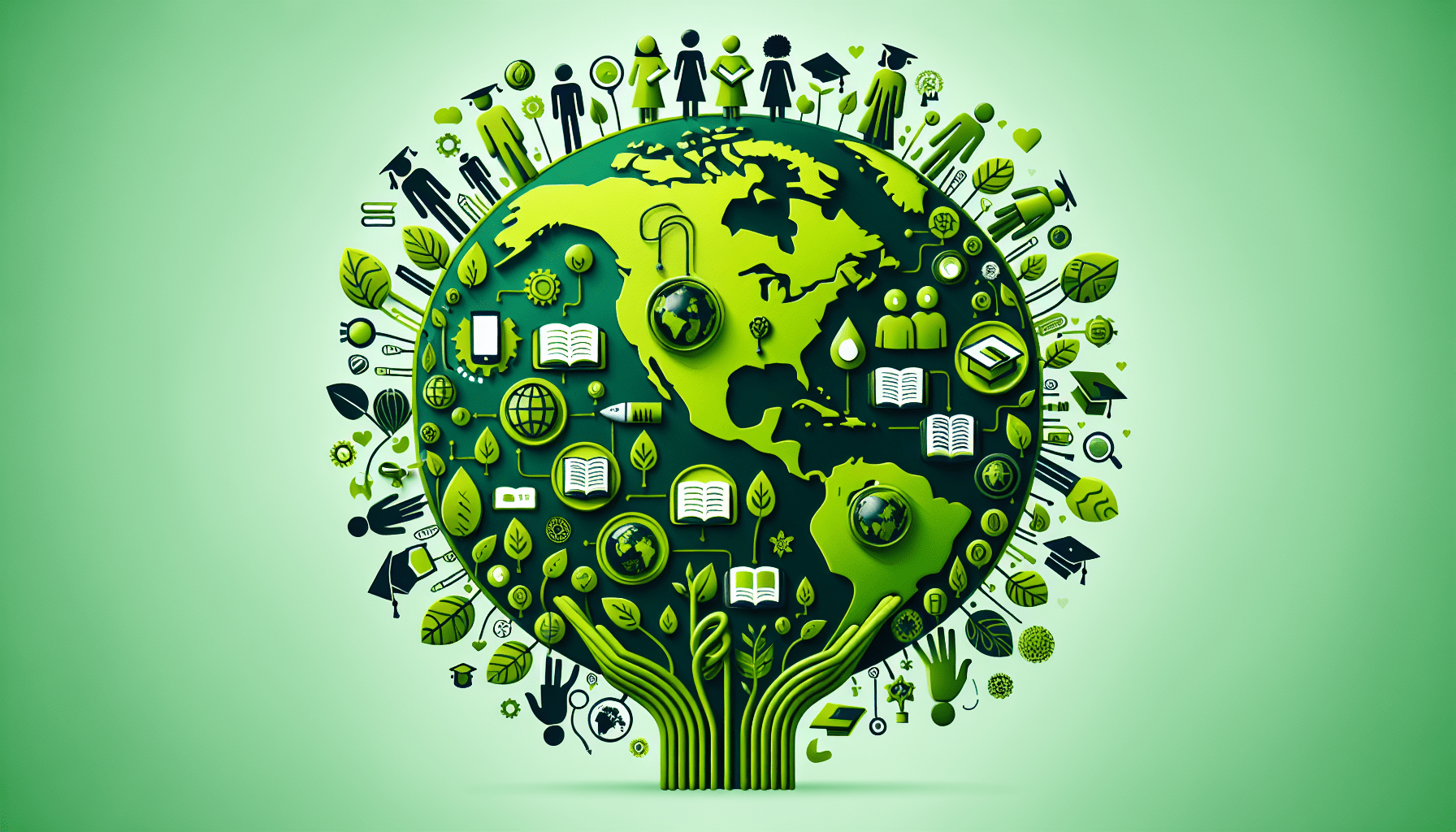In today’s rapidly evolving world, sustainable education programs have become essential in shaping a brighter future for all of us. These programs not only instill a deep respect for our environment but also equip us with the necessary skills and knowledge to address pressing global challenges. By integrating sustainability into our educational systems, we nurture a generation of innovative thinkers and responsible citizens who are committed to creating a more sustainable and equitable society. From fostering environmental stewardship to promoting social justice and economic viability, the benefits of sustainable education programs are far-reaching and transformative. Have you ever wondered what the benefits of sustainable education programs are? It’s a question that has gained increasing importance as our world grapples with environmental challenges and the need for sustainable development. At its core, sustainable education molds individuals to think critically about resource usage and long-term environmental impacts. With this understanding, let’s delve into the various benefits of sustainable education programs and why they matter.

Understanding Sustainable Education
What Is Sustainable Education?
Sustainable education aims to equip individuals with the knowledge, skills, values, and attitudes necessary for creating a sustainable future. This type of education goes beyond environmental science; it incorporates social and economic dimensions to provide a holistic approach.
Why Is It Important?
The importance of sustainable education cannot be overstated. As we face global challenges like climate change, resource depletion, and social inequality, we need an educational framework that can address these multifaceted issues. Sustainable education empowers us to make informed decisions and take meaningful actions towards a sustainable future.
Environmental Benefits
Reduced Carbon Footprint
By educating individuals about sustainability, we can significantly reduce our collective carbon footprint. Sustainable education programs teach us how to use resources efficiently, adopt renewable energy sources, and minimize waste.
Conservation of Natural Resources
One of the primary goals of sustainable education is to promote the conservation of natural resources. Through these programs, we learn the significance of preserving resources like water, forests, and minerals.
Biodiversity Preservation
Sustainable education helps us understand the importance of biodiversity and the roles various species play in maintaining ecological balance. By fostering an appreciation for all forms of life, these programs encourage actions that protect endangered species and their habitats.
Economic Benefits
Job Creation
Sustainable industries such as renewable energy, organic farming, and green technology are booming. Sustainable education programs prepare us for careers in these sectors, thereby creating job opportunities and stimulating economic growth.
Cost Savings
Adopting sustainable practices can lead to significant cost savings for both individuals and organizations. For example, learning to use energy and water more efficiently reduces utility bills. Organizations can also benefit from reduced waste disposal costs and improved regulatory compliance.
Sustainable Economic Growth
By incorporating sustainability into education, we pave the way for sustainable economic growth. This approach ensures that economic development meets present needs without compromising the ability of future generations to meet their own needs.
Social Benefits
Enhanced Quality of Life
Sustainable education can substantially improve our quality of life. It promotes healthier lifestyles by emphasizing the importance of clean air, safe drinking water, and nutritious food. It also fosters social cohesion and a sense of community.
Equitable Opportunities
Education for sustainability emphasizes social equity. It aims to provide equal opportunities for all individuals, regardless of their socio-economic background. This equitable approach reduces disparities and promotes social justice.
Global Citizenship
Sustainable education cultivates a sense of global citizenship. It encourages us to think beyond our local communities and consider the global impact of our actions. This global perspective is critical for addressing issues that transcend national borders, such as climate change and biodiversity loss.

Personal Development Benefits
Critical Thinking
Sustainable education fosters critical thinking skills. It encourages us to question existing practices, analyze alternatives, and make informed decisions. These skills are invaluable not only for addressing environmental challenges but also for personal and professional growth.
Ethical Awareness
Programs focused on sustainability instill a strong sense of ethics. They teach us to consider the ethical implications of our actions on the environment, society, and future generations. This heightened ethical awareness can guide us in making more responsible choices.
Lifelong Learning
Sustainability is a continuous journey that requires lifelong learning. Sustainable education programs inspire a love for learning that extends beyond formal education. They encourage us to stay informed about sustainability issues and continuously seek out new knowledge and solutions.
Institutional Benefits
Enhanced Curriculum
Integrating sustainability into educational curricula enhances the overall quality of education. It makes learning more relevant and engaging by connecting academic concepts to real-world challenges. This approach not only benefits students but also enriches the teaching experience for educators.
Improved Institutional Reputation
Institutions that prioritize sustainable education are often viewed more favorably by stakeholders, including students, parents, and funding bodies. This improved reputation can attract more students and resources, thereby strengthening the institution’s position and impact.
Operational Efficiency
Educational institutions that embrace sustainability can achieve greater operational efficiency. Sustainable practices, such as energy-efficient buildings and waste reduction initiatives, can lead to cost savings and more efficient use of resources.
Benefits for Educators
Professional Development
Sustainable education offers educators opportunities for professional development. It equips them with the knowledge and skills needed to teach sustainability concepts and encourages them to adopt innovative teaching methods.
Enhanced Job Satisfaction
Many educators find teaching about sustainability to be highly rewarding. It provides a sense of purpose and fulfillment, knowing they are contributing to a better future. This enhanced job satisfaction can lead to increased motivation and effectiveness.
Collaborative Opportunities
Sustainable education fosters collaboration among educators, students, and the broader community. These collaborative efforts create a supportive network that enhances the educational experience for everyone involved.
Community Benefits
Community Engagement
Sustainable education promotes community engagement by encouraging individuals to get involved in local sustainability initiatives. This engagement fosters a sense of community and collective responsibility.
Local Economic Development
Sustainable education can drive local economic development by promoting sustainable businesses and practices within the community. This localized approach supports economic resilience and reduces reliance on external resources.
Resilience Building
Communities that prioritize sustainable education are better equipped to face environmental and social challenges. By fostering resilience, these communities can better withstand and recover from adverse events, such as natural disasters or economic downturns.
Global Benefits
Climate Action
Sustainable education plays a crucial role in climate action by raising awareness about climate change and promoting actions to mitigate its impact. This global effort is essential for reducing greenhouse gas emissions and preventing further environmental degradation.
International Collaboration
Sustainable education encourages international collaboration. It fosters a sense of global unity and collective action, which is critical for addressing transnational sustainability challenges.
Peace and Stability
Sustainable education contributes to global peace and stability. By promoting social equity, reducing resource conflicts, and fostering a sense of global citizenship, it helps create a more just and peaceful world.
Challenges and Solutions
Overcoming Barriers
Implementing sustainable education programs comes with its own set of challenges. These may include lack of funding, resistance to change, and limited access to resources. However, these barriers can be overcome through innovative solutions and collaborative efforts.
Securing Funding
Funding is a common challenge for sustainable education programs. However, there are various ways to secure funding, such as grants, partnerships with businesses, and community fundraising efforts.
Building Capacity
Building capacity involves equipping educators and institutions with the necessary skills and resources to implement sustainable education. This can be achieved through professional development programs, resource sharing, and collaborative networks.
Raising Awareness
Raising awareness about the importance of sustainable education is crucial for garnering support and driving action. This can be achieved through public campaigns, community events, and leveraging social media.
Future Prospects
Emerging Trends
Several emerging trends indicate a promising future for sustainable education. These include the integration of technology, the rise of interdisciplinary approaches, and increased emphasis on experiential learning.
Integrating Technology
Technology plays a vital role in enhancing sustainable education. Digital tools and platforms can facilitate interactive learning, broaden access to resources, and enable virtual collaborations.
Interdisciplinary Approaches
Sustainable education benefits from interdisciplinary approaches that connect various fields of study. By breaking down silos, we can foster a more comprehensive understanding of sustainability issues and develop innovative solutions.
Experiential Learning
Experiential learning, such as field trips, hands-on projects, and community involvement, is becoming increasingly important in sustainable education. These experiences provide practical insights and foster a deeper connection to sustainability.
Conclusion
In conclusion, the benefits of sustainable education programs are vast and multifaceted. These programs offer environmental, economic, social, personal, institutional, community, and global benefits. They foster critical thinking, ethical awareness, and lifelong learning while promoting job creation, cost savings, and sustainable growth. Despite the challenges, innovative solutions and collaborative efforts can drive the successful implementation of sustainable education programs.
As we move forward, it is essential to embrace sustainable education and integrate it into all levels of learning. By doing so, we can equip ourselves and future generations with the knowledge and skills needed to create a sustainable and prosperous future for all.
By understanding and leveraging the benefits of sustainable education, we can make a profound impact on our world, ensuring a better quality of life for ourselves and future generations. Let’s commit to prioritizing sustainable education and working together to achieve a sustainable future.



